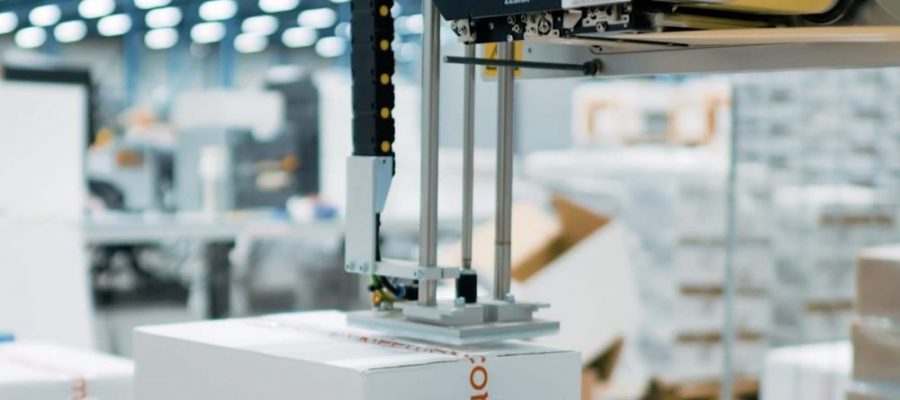
1. Automatic labeling offers higher clock rates
Have you ever tried to peel off a label and stick it on as accurately as possible? Then you know: A human cannot label as quickly and accurately as a machine.
A high-speed label applicator such as the Legi-Air 6000 prints up to 2,250 labels per hour and applies them to continuous cartons. A high-speed label applicator that only applies pre-printed labels even manages cycle rates of up to 120,000 labels per hour!
2. Automatic labeling machines apply labels cleanly and precisely to your products
In manual labeling, the labels are never applied in exactly the same position. Or even worse, it can also happen that the labels stick crookedly. This is visually unattractive and the customer or end consumer may not accept the product. Furthermore, if the labels are not applied cleanly – throwing bubbles or wrinkles and not adhering properly – the information may not be readable. In addition, the label may peel off later.
Unlike humans, a labeling system labels with a tolerance accuracy of +/- 0.3 mm. But that’s not all: The labels adhere to the product over the entire surface, without wrinkles or air bubbles.
3. Automatic labeling reduces errors and complaints
Nobody is perfect: Unfortunately, mistakes happen wherever people work. How quickly is a label applied to the wrong product? A label printer and applicator prints the labels with the appropriate content and always applies them to the right product. This prevents mislabeling and the associated unnecessary returns.
4. With automatic labeling, you are equipped for future requirements
There is nothing better than being successful and seeing an increase in demand for your products. However, in addition to more product orders, this usually means more product variety, often associated with more types of packaging and increasing customer specifications. As a result, more and more individual products have to be produced in a shorter time.
This also affects the labeling area. You’ll either have to pull staff from other tasks or reallocate tasks, or hire more staff to keep up here.
With a modern, high-performance labeling system, you are ready for new requirements in the future. A labeling system can be easily adapted to the new cycle rates. It can also label reliably in multi-shift operation.
5. Automatic labeling saves your staff time
Employees are a valuable asset. When you switch from manual to automatic labeling, your employees can perform other important tasks in the company.
Should I use a label dispenser or a label printer and applicator?
Companies that want to label their products automatically rather than manually have a choice between a label dispenser and a label printer and applicator.
Label dispensers apply pre-printed labels (e.g. decorative labels, primary labels) to products. From wine bottles to pet food, jam jars to shampoo bottles or cleaners – every product needs such a label.
The Alpha Compact HSM is a compact label dispenser. It can label products as a stand-alone solution or integrated into a packaging line. The system applies the labels using the so-called wipe-on process. The label dispenser wipes off the label on the passing product. A pressure roller additionally fixes it in place.
A semi-automatic labeling system provides an introduction to automatic labeling. The operator inserts the product manually and triggers the labeling process at the push of a button.
If variable data is to be printed on the label immediately before the labeling process, label printer and applicators are used. The Legi-Air series labeling systems print information 1:1 onto the label. They then apply the label to the packaging using an applicator. Different applicators are available for different applications: there are linear, rotary or corner applicators.
Typical applications for label printer and applicators are logistics labels and shipping labels. In the food sector, companies use these systems to label their products with information on content and nutritional values, for example. In the chemical industry, it can be warning labels. Or in many other industries, barcode labels with information about the product and batch data.
Case studies in automatic labeling
Two companies that have successfully switched to automatic labeling and label their products automatically are Apetito AG and Continental.
Case study 1: Apetito reduces returns and costs through automated labeling process
Apetito AG, a supplier of frozen products and system catering, provides all cartons of a customer order with a colored label. Some time ago, the company invested in two labeling systems, each with three label applicators. Previously, employees used pens to color-mark the boxes. But this was prone to errors. Sometimes employees forgot to mark lines or accidentally marked two cartons with one line. The result was a relatively high complaint rate due to incorrectly delivered goods. Label dispensers now label the cartons much more reliably and much faster. Since the introduction of the automatic labeling systems, the number of returns has dropped considerably. In addition, the company has also been able to reduce costs.
Case study 2: Automatic labeling at Continental – faster and safer
Tire manufacturer Continental labels its tires fully automatically using a special tire labeling machine. This machine applies the tire label required by EU Regulation EU 1222/2009 to the tires, which vary in diameter and height. Beforehand, it prints the labels individually with the product designation and the information required for classification.
In the past, these labels were first printed and sorted. Then, employees of a service listing company would manually apply these labels to the tires. However, the workers applied most of the labels improperly. Often, they did not adhere properly either. This procedure was therefore time-consuming and harbored many sources of error.
By switching from manual to automatic labeling, the labeling process has become more efficient, reliable and secure.
As you can see – automatic labeling pays off in most cases. Would you like to know where you have potential to optimize production? Weber Marking Systems GmbH, specialist for marking and labeling systems, will be happy to advise you.



